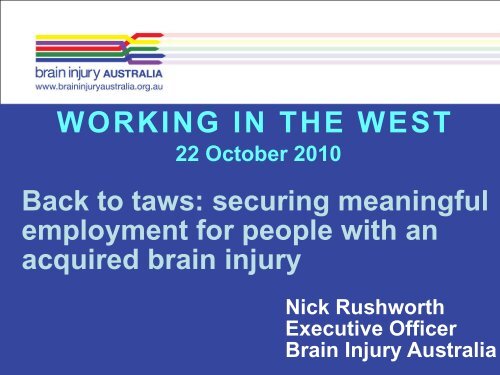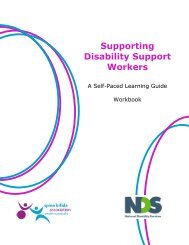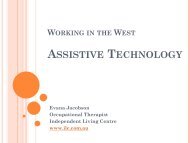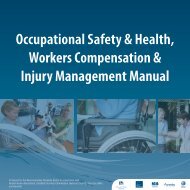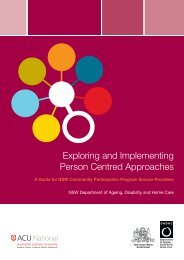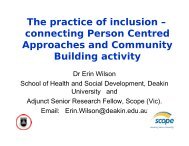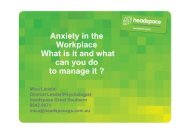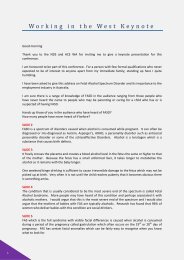Nick Rushworth 2010 - IDEASWA
Nick Rushworth 2010 - IDEASWA
Nick Rushworth 2010 - IDEASWA
Create successful ePaper yourself
Turn your PDF publications into a flip-book with our unique Google optimized e-Paper software.
WORKING IN THE WEST22 October <strong>2010</strong>Back to taws: securing meaningfulemployment for people with anacquired brain injury<strong>Nick</strong> <strong>Rushworth</strong>Executive OfficerBrain Injury Australia
“…peak of peaks”
ACQUIRED BRAIN INJURY (ABI)any damage to thebrain that occursafter birth
…causes?•stroke•alcohol or other drug abuse•brain infection•neurological diseases (Parkinson'sdisease, Huntington's diseaseetc.)•oxygen loss (asthma, neardrowningetc.)•accident or trauma
TRAUMATIC BRAIN INJURY (TBI)results from external forceapplied to the head• falls• motor vehicle accidents• assaults
over 500,000 Australians have anacquired brain injury9 out of every 10 said their ABI was causedby accident or injury (more than half of thosesaid the accident or injury occurred on a“street, road or highway”)2 out of every 3 said thatthey acquired their braininjury when they wereaged under 25 years3 out of every4were men
PHYSICAL DISABILITY• paralysis• poor balance and coordination• chronic pain• fatigue• seizures (1 in 6)• loss of sense of taste or smell• vision and hearing disturbance• speech impairment
COGNITIVE DISABILITYpoor memory and concentration(2 in every 3)= reduced ability- to learn- to plan and- to solve problems
“…new relationships areproblematic. I have changedmy query from „Do I knowyou?‟ to „Do you know me?‟(I think I‟ve really upsetsome people when I usedthe former question.)”
“CHALLENGING BEHAVIOUR”for 2 out of 3, the most disabling• increased irritability• poor impulse control• verbal and physicalaggression• disinhibition
…prime of life…TBI; 10 times as common as spinal injuryProduces, on average, 3 times the level of disability3 in 4 make a good physical recoverythe “invisible” disabilityeffects: ABI or the “person”?short-term memory = inattention, low intelligence?fatigue = laziness?irritability = “personality”?
• ≤ 90% return to care of family;• average costs of care for severe TBI - over$100,000 per year;• “TBIs” “most likely to need help with activitiesrelated to learning and working” > 75%needed assistance;• “less likely (= 2,680) than service usersgenerally to access disability employmentservices”;• 60% likelihood of major mental illness duringlifetime;• changes in sexual function – reduced libido,impotence etc.;• 50% of all marriages involving a partner with aTBI dissolved < 6 years of injury…
secondly,“…presentswell.”
“Client A sustained an extremely severe TBIin a motor vehicle accident, and underwentan inpatient rehabilitation program. She wasdischarged at 8 months post-injury.She attended Centrelink to apply for a DSPwith supporting information from the braininjury rehabilitation unit. When asked by theCentrelink officer if she would like to work,she replied „yes‟ and similarly when asked ifshe felt able to work, she replied „yes‟. Onthose grounds, her application for thePension was refused and she was placed ona Newstart Allowance…
…The client had extensive cognitive, visualand physical impairments, with very littlecarry-over of memory from one day to thenext. This included impairments in insight.Commencing work or attending anemployment agency was unsuitable at thatstage of her recovery.The brain injury rehabilitation unitassessment (available to Centrelink fromthe client) suggested that she neededanother 12 months…and that would be theopportune time to examine her suitabilityfor a vocational rehabilitation program.”
good physical recovery (long-term physical disability = 1/4)?highly motivated to work/ previous employment?underestimates mental and physical fatigue?excessively talkative (“verbosity”)overestimates abilities? overstates ambitions? (“grandiosity”)exaggerates accomplishments? (“confabulation”)difficulty answering questions directly? repeating,returning to same topics (“perseveration”)overly familiar? “inappropriate”? easily irritated? (“disinhibition”)lacking in initiative, in motivation, in drive? (“adynamia”)dramatic, rapid changes in emotion? (“lability”)
eally,• second lowest representation (of all peoplewith a disability)• highest mean number of hours to “get job”• third highest mean direct support per client (58Start your text herehours) after people with autism andintellectual disability• mean level of client support required had fallenfor all disability groups except for peoplewith an ABI…
www.braininjuryaustralia.org.aunick.rushworth@braininjuryaustralia.org.au1800 BRAIN1


